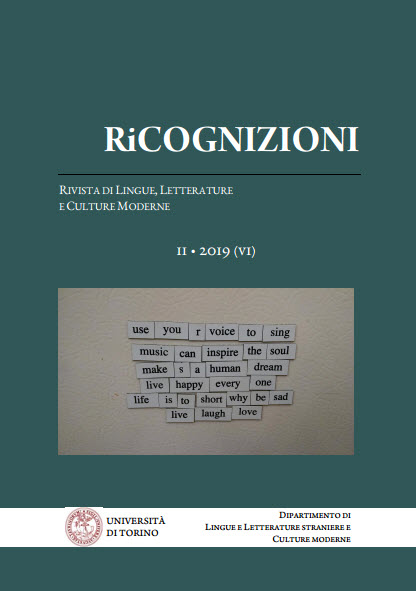THE MELODY OF VOICE: THE AMERICAN LESSON
DOI:
https://doi.org/10.13135/2384-8987/3143Keywords:
American poetry, American poetics, orality, the lyric.Abstract
The essay investigates the relation between the author’s creative writing and the poetry of a group of American writers who delineate a visible tradition within the national production. This poetry may be described as being written in a plain style, or a communicative, “oral” – sometimes colloquial – language, which often relies on some form of free-verse, and thus entrusts its hopes for a natural but perceptible rhythm to the mimesis, or otherwise the skilled use, of intonation. The ground of the influence of these American poets on the author’s writing – which she has learnt to discern and cultivate in her own body of poetry – is precisely this new poetic language. The reason for the irresistible influence of the American poets’ lesson has been the indication of a viable path toward the discovery of a new mode for the contemporary lyric, after its shedding the excesses of the Romantic guise.References
Boorstin, Daniel J. (1958), The Americans: The Colonial Experience, New York, Vintage (Random House).
Brodsky, Joseph (1996), On Grief and Reason (1994), in Joseph Brodsky, Seamus Heaney and Derek Walcott, Homage to Robert Frost, New York, Farrar, Straus & Giroux, pp. 5-56.
Culler, Jonathan (2007), Lyric Adress, in Letteratura e Letterature 1, pp. 21-36.
Culler, Jonathan (2008), Why Lyric?, in pmla 123:1, pp. 201-206.
Dickinson, Emily (1955), The Poems of Emily Dickinson, a cura di Thomas H. Johnson, Cambridge, Mass., The Belknap Press of Harvard University Press, 3 voll.
Eliot, Thomas Stearns (1961), On Poetry and Poets, New York, Noonday. 1943.
Frost, Robert (1995), Collected Poems, Prose, & Plays, a cura di Richard Poirier e Mark Richardson, New York, Library of America.
--- (1965), Selected Letters of Robert Frost, a cura di Lawrance Thompson, London, Jonathan Cape.
Loreto, Paola (2017), Poetiche moderniste. Poesia della voce (1914-45), in Paola Loreto e Cristina Iuli (a cura di), La letteratura degli Stati Uniti. Dal Rinascimento americano ai nostri giorni, Roma, Carocci, pp. 175-196.
---, (2009), The Lyric of Contemporary American Poets: from Emerson to Graham, in Letteratura e letterature 3, pp. 113-129.
Matthiessen, Francis Otto (1941), American Renaissance: Art and Expression in the Age of Emerson and Whitman, London, Toronto, New York, Oxford University Press.
Pound, Ezra (1968), Literary Essays of Ezra Pound, introduzione di T.S. Eliot, New York, New Directions. 1918. [Contiene anche A Retrospect].
Tichi, Cecelia (1974), Spiritual Biography and the “Lords Remembrancers”, in Sacvan Bercovitch (a cura di), The American Puritan Imagination. Essays in Revaluation, Cambridge, Cambridge University Press.
Thoreau, David Henry (1992), Walden and Resistance to Civil Government, a cura di William Rossi, New York, Norton. 1966.
Valéry, Paul (2000), Cahiers/Notebooks, Frankfurt am Main, Peter Lang, vol. II.
Whitman, Walt (1982), Complete Poetry and Collected Prose, a cura di Justin Kaplan, New York, The Library of America.
Williams, William Carlos (1958), Il fiore è il nostro segno, a cura di Cristina Campo, Milano, All’insegna del pesce d’oro.
---- (1991), The Collected Poems: Volume I, 1909-1939, New York, New Directions. 1938
--- (1969), Selected Essays, New York, New Directions. [Contiene anche The Poem as a Field of Action.]
Yeats, William Butler (1954), The Letters of W. B. Yeats, a cura di Allan Wade, London, Rupert Hart-Davis.
Downloads
Additional Files
Published
How to Cite
Issue
Section
License
RiCognizioni is published under a Creative Commons Attribution 4.0 International License.
With the licence CC-BY, authors retain the copyright, allowing anyone to download, reuse, re-print, modify, distribute and/or copy their contribution. The work must be properly attributed to its author.
It is not necessary to ask further permissions both to author or journal board.








